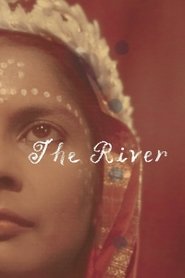Where to begin in this Picnic at Hanging Raj…? An undercurrent of adolescent sexuality runs through The River, a film about elite cultural reproduction as well as a particular class and period — a time that, unlike the stopped LP record we see in one of the opening scenes, cannot simply be played again from the beginning.
The young Harriet slowly comes into focus as the main character within this ethnographic study of India, her sexual awakening (depicted through the flying of the kite and other vivid symbols) mirrors the Indian independence that will occur after the events in the film take place — perhaps just as Valerie's tear-filled soliloquy to John about not wanting things to end is also a comment on the Raj (and Mother's pseudo-stoic speech to Harriet that "we must go on" before collapsing in private). At the same time, whilst the film's view of 'India' is necessarily limited in some ways, it is limited in perhaps precisely the same way that Harriet's view has limited horizons: self-centred, entirely like a child. It is ultimately left to the viewer whether the parallels to colonial paternalism are deliberate, however. Harriet's béguin, Captain John, is an interesting character on the face of it, yet there is something about him that does not entice the viewer to care about his thoughts or desires. It's not that he is a hollow character in the usual sense, but more that he is filled with sawdust, although this is perhaps due to the fact that, as an American, he is additionally a symbol of the emergent cultural and economic hegemon. To its credit, the film heroically resists the obvious temptation to give the main male character interiority — indeed, he's all surface, a mirror for all the other characters once he arrives in India, refracted again in the way that they quickly forget his letters when the baby arrives. Either way, John is closed off to the viewer, perhaps in part due to his PTSD from serving in the unspecified war... in which his deeds were no doubt less heroic than we are led to believe. Perhaps more of the British imperial project would be legible to us if we considered the typical colonialist less of an absurdly cruel monster out of a fairy tale, but a traumatised, damaged figure who does not feel at home in the metropole and can be quite easily absorbed by the bureaucratic human threshing machine of Empire.
The River depicts the girls' infatuation with him as rather childlike throughout — even quite pathetic at times. Yet whilst depicting it that way, the film as a whole does not entirely treat it as such. This is especially given elder Harriet's narration. These voiceovers are some of the best parts of the film for me — orientalising throughout, perhaps, but often beautifully poetic, and likely taken from the original book that I should read one day.
The bratty child acting is, alas, as weak as the family's genuine engagement of the surrounding Indian culture outside of stories. (Or as shallow as the emotions in the European music being practised throughout the house. Although note that this literalises the background hum of Western civilisation in the family.) Apparently, much of the filmed footage, including the children, had to be thrown away, and what remains is often painful to watch. And whilst the film is truly remarkable in its depiction of Indian culture for a film made in the late 1940s, it does (as alluded above) still center the white family. And nobody seems to have told the film that simply knowing a bunch of local Hindu rituals and festivals doesn't amount to a true appreciation of a culture after all... (And don't forget that Harriet's Krishna story that mystifies the Orient is entirely her invention!).
These are actually quite minor quibbles of mine, though, for this is absolutely superior filmmaking by Renoir, who, we should remember, wanted to make "a film about India without elephants and tiger hunts". Observe, for example, that we only see the empty coffin being delivered to the "big house" — we are not shown the body lying within it like almost all directors might be tempted to do. The scene is affective enough that we only need a second of Ram frying at the gate. It was also extremely wise not to cast Captain John with a traditionally 'attractive' actor, which would have not only distracted the viewer by their attendant celebrity, but it would have simplified Harriet's symbolic devotion to Captain John, two problems that taint the rather handsome David Farrar's casting as Mr Dean in Powell and Pressburger's Black Narcissus (1947) which must, for many reasons to numerous to mention here, must be considered a very close relation of this film.
Anyway, this didn't quite hit the emotional notes for me that I think it wanted to, but only because I first saw it after (in particular) Satyajit Ray's The Music Room (1962).
Today, the ultimate effect of The River’s otherwise strange projection of an idyllic pre-1920 India into the era of Indian independence is perhaps to challenge Forster’s view of Indians and Europeans as condemned to mutual incomprehension and return to something more like Kipling’s idea of learning from India. The Europeans in the film’s foreground are already an anachronism in an India emerging from colonial rule, but they can still draw strength and inspiration from its age-old customs and beliefs.
— Ian Christie (Criterion)
Synopsis: Director Jean Renoir’s entrancing first color feature—shot entirely on location in India—is a visual tour de force. Based on the novel by Rumer Godden, the film eloquently contrasts the growing pains of three young women with the immutability of the Bengal river around which their daily lives unfold. Enriched by Renoir’s subtle understanding and appreciation for India and its people, The River gracefully explores the fragile connections between transitory emotions and everlasting creation.

